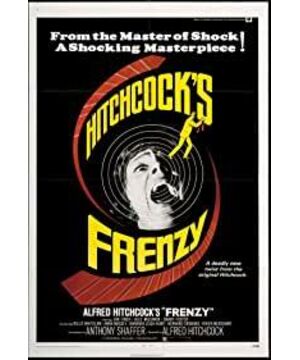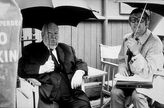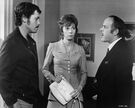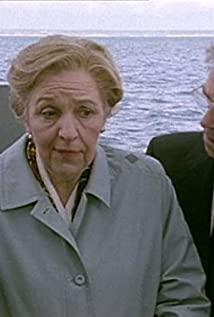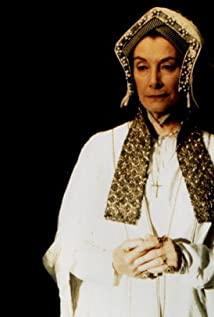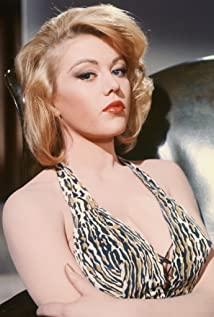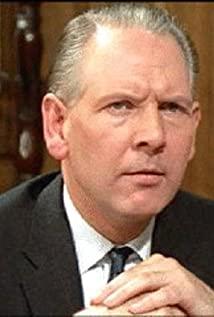"Frenzy" is Hitchcock's penultimate film work, and it is also one of Hitchcock's works in his later years that is highly acclaimed, and can be regarded as a masterpiece of his later works.
What's special about "Frenzy" is that it was filmed in Hitchcock's "hometown" London. After filming "Jamaica Hotel" (1939), Hitchcock went to Hollywood to develop. After that, he worked and lived in the United States for a long time, and rarely returned to the United Kingdom, so that many fans regarded him as a master of American film (he did join later) American citizenship).
Hitchcock was born in 1899, entering the 70s, he also came to the ancient years. At this age, it is easy to homesick, so Hitchcock returned to his "hometown" London, and in 1972 he made this very Hitchcock-style movie "Frenzy"-this one The appearance of the work can be said to be a "Hitchcock-style journey to find roots."
After "The Flock of Birds" (1963), Hitchcock's creative ability began to decline, and he never produced a stunning classic. The pace of his film creation also began to slow down, and in the following ten years, he directed only five films (feature films).
Hitchcock is a film master who started from London. Perhaps the city will still patronize him and will bring inspiration and good luck to the film master.
After Hitchcock arrived in Hollywood, he has also experienced ups and downs. He has filmed luxurious productions of the all-star lineup, and can also rebuild his prestige at a lower cost (such as "The Cry" [1960]).
Among Hitchcock's film works, "Frenzy" is a relatively low-cost work. The film lacks big-name celebrities and has no grand scenes. However, the production cost of a movie is not necessarily related to the quality of the movie. Sometimes the lower cost makes the director more daring to innovate and break through.
"Hitchcock has been making the same movies all his life." This is a more common "evaluation" of Hitchcock. Yes, Hitchcock is a film master who is deeply involved in suspense and thriller genres, but he is a film master because he can constantly find new "hot spots" in the established "film programs".
"Crazy Furious" is such a work with Hitchcock's last "hot spot".
1. London, London
At the beginning of the film, it was an aerial shot of the city of London. The Thames and the famous Twin Tower Bridge on the river were very "iconic" and led the audience into London.
As the camera turns, the audience's viewpoint is brought to the shore again. A politician is giving a speech, and a large number of people are "watching". At this time, a sudden situation occurred, and a female body with a tie around her neck appeared on the river. The people who eat melons naturally flock to "watching", and Hitchcock himself "mixes" among the people who eat melons. He wears a round hat and looks a little sad.
Hitchcock's appearance in the film as a "passerby" has become a major feature of his film, and his appearance this time seems to imply that heinous atrocities have taken place in his "hometown".
Like most of Hitchcock's works, "Frenzy" was mainly shot in the studio.
Outside the Thames, another main location of "Frenzy" is at the fruit wholesale market in London at the time, a place called Covent Gordon. This is where the murderer Rusk works-he is a fruit shop owner.
What's interesting is that during the filming process, an old man took the liberty to come to Hitchcock. The staff around Hitchcock stopped the old man at first. When the old man said that he knew Hitchcock’s father, Hitchcock regarded him as a "guest" and invited him to eat on the set. Dinner and talk to him about the past.
The old man told Hitchcock that Hitchcock's father had done business in Covent Gordon. Hitchcock comes from an ordinary merchant family, but he has no interest in the business of the family at all. Unexpectedly, a few decades later, he would "encounter" with his father in this way.
2. Three murders
"Murder" is almost Hitchcock's "nirvana", and of course murder is indispensable in "Knights".
The serial killer Rusk "strangled" the number of women with a tie. The film does not give the number, but the film presents three murders.
The first scene is intuitive and violent, especially the death of the deceased. It is terrifying and even disgusting to the audience.
In the second scene, after the murderer and the victim enter the door, Hitchcock uses an empty lens to "present" the murder. In the picture, the camera starts with the closed door, goes down the stairs, and finally "exit" to the street, where people come and go. The audience didn't see anything, but they all knew what happened.
Before the two murders started, the murderer said the same line: "You are my type." In the second murder, when the careful audience heard this line, they had a chuckle in their hearts.
After Rusk returned home after handling the corpse, he suddenly found that his brooch was missing. At this time, a flashback of the murder appeared in his mind.
In the third scene, after the unknown woman was strangled to death by Rusk with a tie, she was discovered by "the innocent man" Richard Blaney and police officer Oxford, and Rusk was "visible".
In Hitchcock's works, the performance of violence is generally more subtle, but in "The Maniac", violence is naked. Moreover, there are more obvious nudity shots in the film, and the scale is large, which is not available in Hitchcock's previous works.
Although Hitchcock's works are full of murder and violence, he has always handled these "unsuitable for children" content relatively elegantly. This time, why does he give the audience a sense of "spicy eyes"?
The murderer in "The Murderer" is a highly aggressive sexual violent maniac. Only large-scale murder scenes and nudity scenes can fully express the murderer's perversion and brutality.
In addition, the performance of European and American films in the 1960s in terms of violence and pornography has become larger and larger. In doing so, Hitchcock may not accept the old and "provoke" the cutting-edge film director-Hitchcock can also It’s shot like this, and it’s more "ruthless" than you guys!
3. Black humor
Hitchcock has always been humorous. He knows very well that while the audience is frightened, they also want to have occasional moments of relaxation. Back in England, his humor became more elegant.
Officer Oxford has a wife who loves cooking, and she makes various "goodies" for him every day. But these so-called "delicious foods" are actually very characteristic of my Cantonese. For Oxford, this is a huge "torture"-as a typical British person, he actually prefers to cook steak and grill. Potato.
Although Oxford doesn't eat well every day, he can get the "inspiration" to solve the crime in small talks with his wife.
This kind of "dislocation", coupled with the exaggerated performance of husband and wife singing, has created a very British black humor.
Also the police officer Oxford, at the end of the film, said to the murderer: "Mr. Rusk, you forgot to put on your tie." What an elegant and humorous "testimony"! Then, we saw the suitcase Rusk used to hide the body fell on the ground. This concludes the video.
Compared with classics such as "The Horror" (1960), "The Ecstasy" (1958), and "Rear Window" (1954), "Frenzy" is indeed not Hitchcock's best work, but It can definitely be one of the best works of Hitchcock’s second echelon. It is a typical Hitchcock work. It is Hitchcock’s "Root Journey". The "last blow" in seeking innovation and change.
View more about Frenzy reviews


